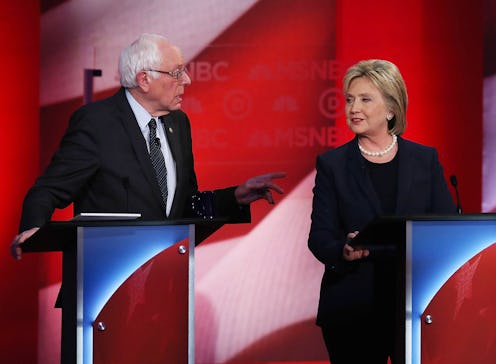News
Guess Who's The Most Searched Dem Debate Candidate
If it weren't for Google, who would be there to explain what's going on in all those billions of minds around the globe? The tech giant is there for you every time, literally finishing your sentences for you when you go to type in a question or a phrase on the search engine. And the Google team has your back when you're wondering just how many people are thinking the same thing you are. For the 2016 presidential campaign, Google has been steadily providing the stats on which candidates are giving folks the urge to search. So who was the most searched candidate from the Democratic debate in New Hampshire? It turns out that almost every state was looking up one presidential hopeful in particular.
Just after moderators Chuck Todd and Rachel Maddow wrapped up the head-to-head event at the University of New Hampshire, the tech company published GoogleTrends data that presented the most searched candidate for each U.S. state. In a whopping 45 out of 50 states, Sanders took the top spot for Google searches at the end of the debate. That left just five states where Google users were more interested in seeking out info on Hillz: Idaho, New Mexico, North Dakota, Iowa, and Mississippi.
Now, the GoogleTrends map presents literally what it sets out to show: the most searched candidate at the end of the debate. The data team has to pick a moment in time from which to draw the information, and in this case the stats are being pulled from searches happening at the conclusion of the event. Naturally, then, there are a few caveats to the statistic.
To help demonstrate one of the map's limitations, Google helpfully published a motion graphic displaying the candidates' search rankings just in New Hampshire. Matching the constant back-and-forth, Sanders and Clinton were constantly replacing each other as the most searched candidate throughout the night. Had the researchers chosen to take the numbers from, say, approximately 10:30 p.m. ET, Clinton would have been the winner in New Hampshire and possibly a slew of other states.
So for the state-by-state victories for number of searches, the colors on the map don't necessarily represent actual popularity of the candidate in each location. Even if Sanders only had one more search in New Jersey or Texas at the time chosen, the state is going dark blue all the way.
The map, then, doesn't exactly mean the majority of the country is all in on Bernie. Ninety percent, however, is still pretty stinkin' high, considering that in the case of a close race, you'd think the map would end up being a bit more on the marbled side.
